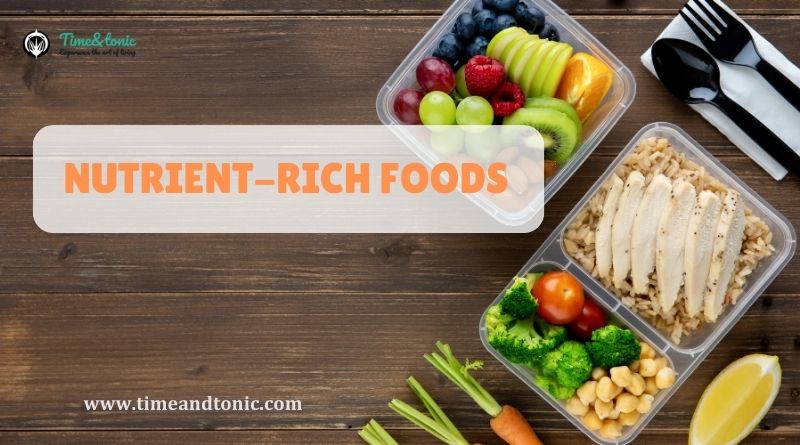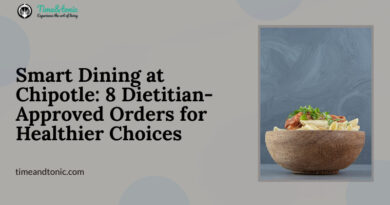Top 10 Nutrient-Rich Foods to Include in Your Diet
The pursuit of ideal health has never been more important in the hectic pace of modern life. Amidst this pursuit, the spotlight has firmly settled on a category of foods that stand as beacons of wellness: Nutrient-Rich Foods. These culinary powerhouses not only tantalize our taste buds but also nurture our bodies from within. The term “nutrient-rich foods” encapsulates a diverse array of edibles, each brimming with a rich concoction of vitamins, minerals, antioxidants, and fibers essential for our well-being.
In this comprehensive guide, we embark on a journey to unravel the secrets of these nutritional wonders. From the verdant fields of leafy greens to the depths of the ocean where fatty fish swim, we will explore the vibrant spectrum of foods that are not just sustenance but a source of vitality. Join us as we delve into the scientific marvels, the delectable recipes, and the practical tips that will empower you to enrich your diet and transform your health.
Buckle up, as we navigate the enticing world of nutrient-rich foods, unlocking the doors to a healthier, more vibrant you.
Nutrient-Rich Foods
Also Read: High-Protein Meals for Lasting Fullness
Nutrient-rich foods refer to a category of edibles that are dense in essential nutrients while relatively low in calories. These foods are powerhouses of vitamins, minerals, antioxidant, fiber, and other vital nutrients that the human body requires for optimal functioning. Unlike empty-calorie foods that provide little to no nutritional value, nutrient-rich foods pack a substantial punch in terms of health benefits.
The richness of these foods lies not only in the variety of nutrients they offer but also in their ability to promote overall well-being. Nutrient-rich foods are sourced from various food groups, including fruits, vegetables, whole grains, lean proteins, nuts, and seeds. These natural, unprocessed foods provide the body with the necessary tools for energy production, immune support, cell repair, and disease prevention.
Benefits of Consuming Nutrient-Rich Foods
Consuming a diet rich in essential nutrients offers a plethora of benefits that contribute significantly to overall health and well-being. Here’s a detailed look at how incorporating nutrient-rich foods into your diet can transform your life:
1. Enhanced Energy Levels and Vitality: Nutrient-rich foods are packed with complex carbohydrates, proteins, and essential vitamins, providing a sustainable source of energy. Regular consumption can help combat fatigue, improve stamina, and enhance overall vitality, ensuring you feel energized throughout the day.
2. Improved Immune System: Nutrient-rich foods, especially those high in vitamins C, D, and antioxidants, bolster the immune system. A robust immune system helps the body fight off infections and illnesses, reducing the frequency and severity of common colds, flu, and other diseases.
3. Better Digestion and Gut Health: Fiber-rich foods such as fruits, vegetables, and whole grains promote healthy digestion. They aid in regular bowel movements, prevent constipation, and support a diverse and balanced gut microbiota.
4. Healthy Weight Management: Nutrient-dense foods are often low in calories and fat, making them ideal choices for those looking to manage their weight. These foods provide a sense of fullness, reducing overall calorie intake and curbing unhealthy cravings. Additionally, they support the body’s metabolic processes, aiding in weight loss and weight maintenance.
5. Reduced Risk of Chronic Diseases: A diet rich in nutrients has been linked to a decreased risk of chronic diseases such as heart disease, diabetes, and certain cancers. Nutrient-rich foods contain antioxidants and phytochemicals that neutralize free radicals, reducing oxidative stress and inflammation, both of which are linked to chronic diseases.
Top 10 Nutrient-Rich Foods
Following are the best nutrient-rich foods:
Leafy Green Vegetables

Leafy green vegetables, ranging from spinach and kale to Swiss chard and collard greens, are nature’s gift to our well-being. Brimming with vitamins A, C, and K, along with essential minerals like iron and calcium, leafy greens are a nutritional powerhouse. They are low in calories but high in fiber, making them a weight-loss-friendly choice.
These greens are rich in antioxidants, particularly flavonoids and carotenoids, offering potent anti-inflammatory and immune-boosting properties. Incorporating leafy greens in your diet supports bone health, enhances vision, and aids in detoxification. Whether in salads, smoothies, or cooked dishes, these verdant wonders provide a burst of freshness and vitality to every meal, making them indispensable for a healthy lifestyle.
Berries

Berries, whether they’re strawberries, blueberries, raspberries, or blackberries, are nature’s tiny treasures, bursting with flavor and nutrition. These colorful gems are packed with antioxidants, particularly anthocyanins, which have been linked to improved heart health and reduced oxidative stress. Berries are rich in vitamin C, boosting the immune system, promoting healthy skin, and aiding collagen production.
Additionally, they are a excellent source of dietary fiber, supporting digestion and promoting a feeling of fullness. Berries are also low in calories, making them an ideal snack for those aiming for weight management. Their natural sweetness makes them a delightful addition to cereals, yogurts, and desserts, ensuring a burst of freshness and health benefits in every bite.
Nuts and Seeds

Nuts and seeds, the unsung heroes of a healthy diet, are tiny powerhouses brimming with essential nutrients. Packed with heart-healthy monounsaturated and polyunsaturated fats, they provide sustained energy and aid in reducing bad cholesterol levels. Rich in plant-based protein, nuts and seeds are vital for muscle repair and growth. Moreover, they’re abundant sources of vitamins (like E and B-complex) and minerals (such as magnesium and zinc) crucial for overall well-being.
Their high fiber content promotes satiety, making them perfect snacks for weight management. Antioxidants in nuts and seeds combat inflammation and oxidative stress, reducing the risk of chronic diseases. Incorporating these crunchy delights into salads, cereals, or simply enjoying them as snacks amplifies both flavor and nutrition in your diet.
Whole Grains

Whole grains, from quinoa and brown rice to oats and barley, embody nature’s perfect balance of taste and nutrition. Unlike refined grains, whole grains retain their bran, germ, and endosperm, ensuring a rich supply of fiber, vitamins, and minerals. Packed with complex carbohydrates, they provide sustained energy, promoting endurance and focus throughout the day.
The fiber in whole grains aids digestion, preventing constipation and supporting a healthy gut microbiota. These grains are rich in B-vitamins, fostering brain health and reducing stress. Additionally, they contain antioxidants, guarding the body against harmful free radicals. Incorporating whole grains into your diet through hearty salads, comforting porridges, and wholesome bread ensures a delicious and healthful culinary experience.
Also Read: Satisfying Cravings with Smart Late-Night Snacks
Fatty Fish

Fatty fish, such as salmon, mackerel, and sardines, are culinary marvels that offer an abundance of health benefits. What sets them apart is their high concentration of omega-3 fatty acids, essential for heart and brain health. These healthy fats reduce inflammation, lower blood pressure, and enhance cardiovascular function. Fatty fish are rich in high-quality proteins, aiding in muscle repair and growth.
Moreover, they are a natural source of vitamin D, crucial for bone health and immune support. Consuming fatty fish regularly has been linked to improved mood, better cognitive function, and reduced risk of chronic diseases. Grilling, baking, or steaming these delectable fish varieties ensures a mouthwatering meal brimming with wellness.
Legumes

Legumes, encompassing beans, lentils, and peas, are nature’s nutritional gems, offering a wealth of health benefits. Renowned for their high protein content, they are indispensable for vegetarians and vegans, supporting muscle growth and repair. Beyond protein, legumes are rich in dietary fiber, aiding digestion, preventing constipation, and promoting a healthy gut microbiome.
They boast a low glycemic index, making them ideal for managing blood sugar levels. Packed with vitamins, minerals, and antioxidants, legumes bolster the immune system, combat inflammation, and reduce the risk of chronic diseases. Their versatility shines in soups, stews, salads, and dips, making them a delicious and nutritious addition to any diet.
Dairy or Dairy Alternatives

Dairy products and their alternatives offer a diverse range of nutrient-rich choices suitable for various dietary preferences. Traditional dairy provides an excellent source of calcium, vital for bone health, and protein essential for muscle repair. It’s also rich in B-vitamins, promoting energy production and overall well-being. For those lactose intolerant or following a vegan diet, dairy alternatives like almond milk, soy milk, and coconut yogurt offer comparable nutritional benefits.
Fortified with calcium and vitamins, these alternatives ensure that individuals can meet their daily nutrient requirements. Whether enjoyed in a glass, poured over cereal, or incorporated into smoothies, dairy and its alternatives contribute to a balanced and flavorful diet, catering to the needs of everyone.
Colorful Vegetables

Colorful vegetables, ranging from vibrant bell peppers and carrots to deep purple eggplants, are not only visually appealing but also packed with a spectrum of nutrients. Their bright hues signify rich concentrations of vitamins, minerals, and antioxidants, essential for overall health. Red vegetables, like tomatoes, contain lycopene, known for its cancer-fighting properties. Orange and yellow vegetables, such as sweet potatoes, are abundant in beta-carotene, promoting good vision and immune strength.
Green vegetables, like broccoli and spinach, boast chlorophyll and folate, vital for energy production and cell renewal. Consuming this diverse array ensures a wide range of nutrients, supporting various bodily functions and reducing the risk of chronic illnesses. Incorporate these colorful wonders into salads, stir-fries, and soups for both flavor and nutrition.
Lean Proteins

Lean proteins, including poultry, fish, tofu, and legumes, are indispensable for a balanced diet and optimal health. Packed with high-quality proteins, they aid in muscle repair, growth, and maintenance. Unlike fatty cuts, lean proteins are low in saturated fats, reducing the risk of heart disease and promoting overall cardiovascular health.
Additionally, they provide essential amino acids crucial for various bodily functions, ensuring the body operates at its best. Lean proteins are also rich in minerals like iron and zinc, vital for immunity and energy production. Whether grilled, baked, or stir-fried, these protein sources offer a satisfying and nutritious foundation for meals, ensuring both flavor and wellness on your plate.
Fruits

Fruits, nature’s delectable gifts, offer a treasure trove of essential nutrients and flavors. Packed with vitamins, particularly vitamin C, fruits boost the immune system, promoting a robust defense against illnesses. They are rich in dietary fiber, aiding digestion, preventing constipation, and supporting a healthy gut. Fruits are a natural source of antioxidants, combating oxidative stress and inflammation in the body.
The variety of colors signifies diverse nutrients—anthocyanins in blueberries, for instance, are renowned for their brain-boosting properties. From the juicy goodness of oranges to the exotic sweetness of mangoes, fruits provide a guilt-free indulgence, satisfying sweet cravings while ensuring a nutrient-packed addition to your diet.
Also Read: Bliss Belly Fat Trimming Tea’s
Conclusion
In the tapestry of a healthy life, nutrient-rich foods emerge as vibrant threads, weaving together vitality, wellness, and culinary delight. Through this exploration, we’ve unearthed the secrets of leafy greens, the sweetness of berries, the crunch of nuts and seeds, and the nourishment in whole grains, fatty fish, legumes, and colorful vegetables.
Embracing lean proteins and the natural sweetness of fruits, we’ve embraced nature’s bounty. As you embark on your journey towards a healthier you, remember, these foods are not just ingredients; they are your pathway to a more vibrant, energetic, and fulfilling life.
FAQ
Nutrient-rich foods support various bodily functions, boost the immune system, aid digestion, and reduce the risk of chronic diseases. They provide sustained energy, promote healthy weight management, and contribute to overall vitality and longevity.
You can include nutrient-rich foods by incorporating colorful fruits and vegetables, whole grains, lean proteins, nuts, seeds, and fatty fish into your meals. Experiment with recipes, smoothies, and salads to make them delicious and appealing.




